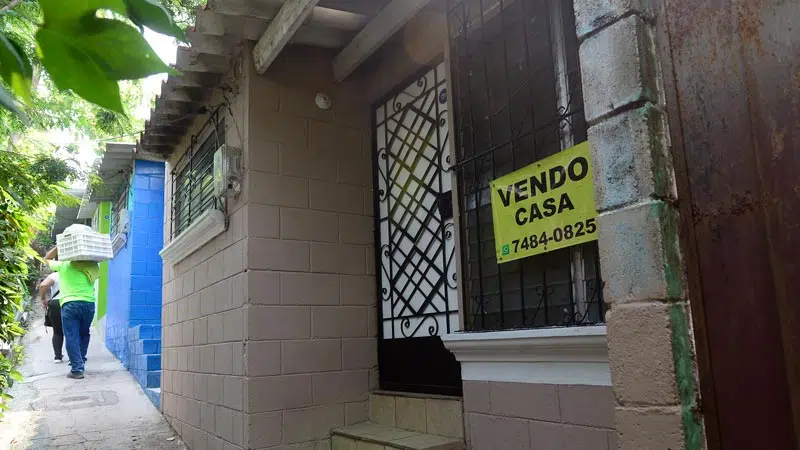Jennifer Medrano and her partner were able to buy their own home a year ago in the community of Valle Verde, located in the municipality of Apopa, in one of the areas where Gang 18 and the MS gang split. It was a community that for years had been catalogued as a red zone, and where it was impossible to live unless you were “born there”.
Medrano recounts how many of his neighbors had to flee and abandon their homes when the situation became “dangerous because of the boys,” so the gang members themselves rented the properties at a price that suited the tenants’ pockets. This situation was repeated in other communities such as Ciudad Futura, La Campanera, Vista al Lago, Distrito Italia, among others.
Jennifer has lived in Valle Verde all her life, and now that she has made her home and the security situation in the area has changed, she did not hesitate to look for a house close to where her mother lives to have something of her own.
They bought a house for $14,000 with a down payment of $80.00, which with interest will cost her $28,000 over 30 years. “Now everything is expensive, houses are worth three times what they were two years ago, and not only with individuals, but also with the fund,” she adds, and that the increase in prices has forced them to adjust their budget.
For Alex Renderos, a researcher and professor of architecture at the Universidad Centroamericana José Simeón Cañas (UCA), specializing in housing, habitat and urban planning, the lack of regulation and legal framework has led to speculation in housing prices, where the original owner deducts how much his property can be worth as long as there is someone with the economic conditions to pay.
For economist José Luis Magaña, there is a real estate speculation bubble that is putting home ownership out of reach for many Salvadorans.
He adds that “we already had problems with access to housing, and now this new phenomenon is becoming more acute, and the inaction of the state in the speculative context of the real estate market does not create a decent acquisition environment for citizens.
Precios de las viviendas en comunidades que antes eran “inseguras” han incrementado
Jennifer Medrano junto a su pareja lograron hacerse de su propia vivienda hace un año en la comunidad Valle Verde, ubicada en el municipio de Apopa, en uno de los pasajes donde era la división entre la pandilla 18 y la mara MS. Una comunidad que por años había sido catalogada como zona roja y que era imposible habitar si no eras “nacido ahí”.
Medrano relata como muchos de sus vecinos tuvieron que huir y abandonaron sus casas cuando la situación era “peligrosa por los muchachos”, razón por la cual eran las mismas estructuras de pandilleros quienes alquilaban las propiedades a un costo que se adecuaba al bolsillo de los inquilinos. Situación que se replicaba en otras comunidades como Ciudad Futura, La Campanera, Vista al Lago, Distrito Italia, entre otras.
Jennifer ha vivido toda su vida en Valle Verde y ahora que ella ya formó su hogar y la situación de seguridad ha cambiado en la zona, no dudo en buscar una casa cerca de donde vive su madre para tener algo propio.
Compraron una vivienda en $14 mil pagando una cuota de $80.00, la cual con los intereses deberá pagar $28,000 en un plazo de 30 años. “Ahora todo está caro, las casas valen el triple de lo que valían hace dos años y no solo con personas particulares, sino también con el Fondo”, agrega y que el aumento de los precios ha hecho que tengan que ajustar su presupuesto.
Para Alex Renderos, investigador y docente de Arquitectura en la Universidad Centroamericana José Simeón Cañas (UCA), con especialización en vivienda, hábitat y planificación urbana, ante una falta de regulación y una falta de un marco legal, los precios de las viviendas caen en la especulación donde el propietario original deduce cuánto puede valer su propiedad siempre y cuando exista alguien que tenga las condiciones económicas para pagar.
Para el economista José Luis Magaña, existe una burbuja especulativa inmobiliaria, lo que lleva a que la adquisición de una vivienda sea inaccesible para muchos salvadoreños.
Además, agrega que ya teníamos problemas de acceso a una vivienda y este nuevo fenómeno ahora se está agudizando y que la inacción del estado en el contexto especulativo del mercado inmobiliario no genera un ambiente de adquisición digno para los ciudadanos.

